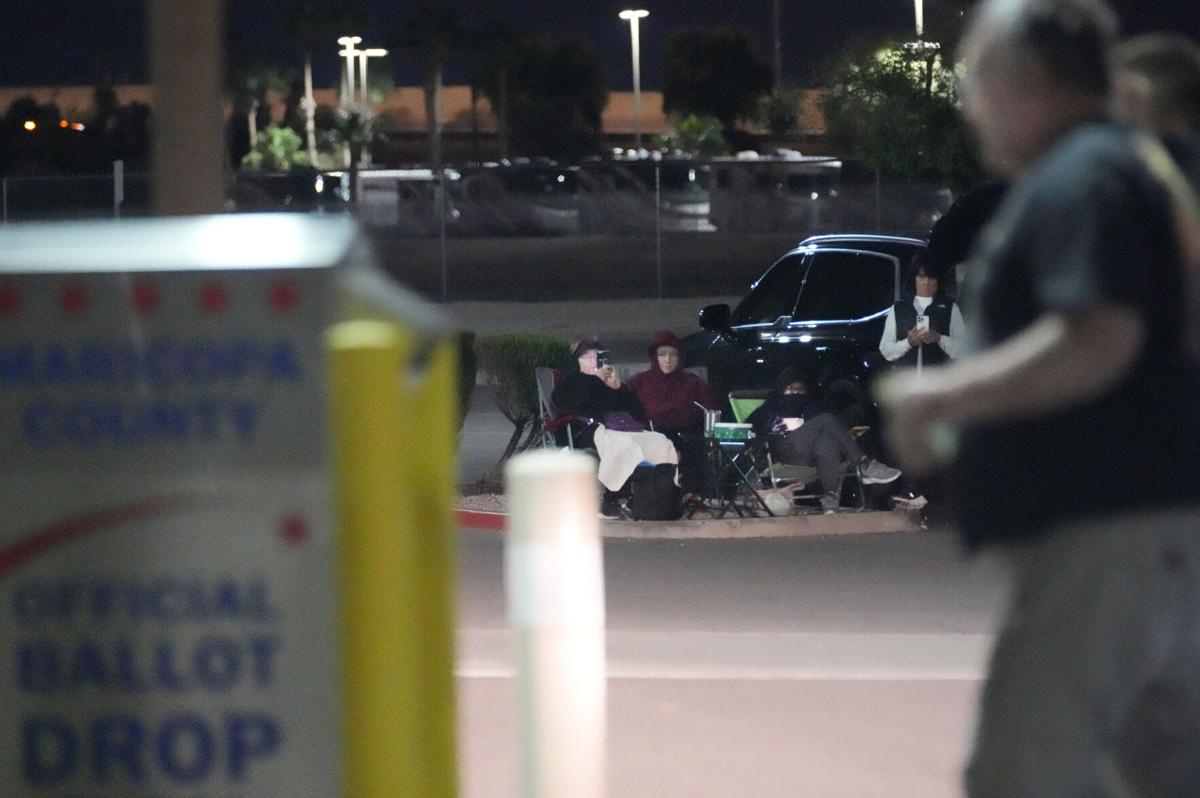PHOENIX — A federal judge on Friday refused to block the activities of those watching ballot drop boxes in Maricopa County, ruling they are engaged in constitutionally protected conduct.
“Plaintiffs and many voters are legitimately alarmed by the observers filming at the county’s early voting drop boxes,” wrote Judge Michael Liburdi. And the judge said that the First Amendment rights of individuals to speak and gather do not extend to “true threats.”
But he said the groups that sought an injunction never provided him with any evidence during a court hearing earlier this week that anything being done by Clean Elections USA and Melody Jennings, its founder, reach that level.
“Defendants have not made any statements threatening to commit acts of unlawful violence to a particular individual or group of individuals,” Liburdi wrote. “There is no evidence that defendants have publicly posted any voter’s names, home addresses, occupations, or other personal information.”
The judge also cited statements by Jennings that her volunteers are to “follow laws,” admonishing them to stay outside the legally prescribed 75-foot limit from polling places, and posting on social media that those affiliated with her group should not engage with or talk to individuals at drop boxes.
“Even if these statements are mere window dressing, a reasonable listener could not interpret Ms. Jennings social media pronouncement that alleged ‘mules’ will ‘shrink back into the darkness’ following her drop box initiative as true threats,” Liburdi said.
That refers to clams by Jennings that the purpose of having volunteers near drop boxes is to deter those who would violate Arizona’s “ballot harvesting” law. That statute says individuals may handle only their own voted ballots, with exceptions for family members, those in the same household and caregivers.
“Ms. Jennings’ social media posts demonstrate that she believes the presence of her volunteers alone would convey messages to these supposed ‘ballot mules,’ “ Liburdi said. “The message is that persons who attempt to break Arizona’s anti-ballot harvesting law will be exposed.”
In his ruling, the judge acknowledged that three separate Maricopa County voters filed formal complaints alleging voter intimidation near drop boxes, both of which he noted are positioned so that people can drive up to deposit their ballots. All three involved individuals taking photos of the voters or their vehicles, though in one the person making the complaint said those near the drop box accused him and his wife of being “mules.”
But Liburdi said there was no evidence presented that Jennings or Clean Elections USA were trying to deter legal voting.
Threats aside, the judge acknowledged that the 1965 Voting Rights Act also makes it illegal to “intimidate” anyone voting or attempting to vote.
Only thing, Liburdi noted, is the statute does not define what that includes, leaving it up to the courts.
He said it is clear intimidation can include fear of economic harm, legal repercussions, privacy violations and even surveillance. But the judge said nothing being done by Jennings or her volunteers at the ballot boxes fits that definition.
Liburdi also was not swayed by arguments by attorney David Fox, who represents those challenging the activities of Clean Elections USA, that having volunteers take photos and videos amounted to intimidation.
“It is well established that there is a First Amendment right to film matters of public interest,” the judge said.
“The Supreme Court has recognized a right to gather news,” Liburdi wrote. “And the public has a First amendment right to receive information and ideas.”
The judge said those constitutional protections go beyond the media and extend to to the self-expression of individuals, all of which he said “prohibit government from limiting the stock of information form which members of the public may draw.”
“This right to receive information exists regardless of that information’s social worth,” he said.
The judge said that, in refusing to enjoin the activities of those watching ballot boxes, he was trying to consider all interests. And that, he said, includes the public’s interest in protecting voters from harassment, intimidation, coercion or fear.
“There is no right more precious in a free country than that of having a voice in the election of those who make the laws under which, as good citizens, we must live,” Liburdi said.
“An individuals’ right to vote is fundamental,” he said. “But so to is an individual’s right to engage in political speech, assemble peacefully, and associate with others.”
And Liburdi said any injunction he would issue in this case “would likely have a chilling effect on others’ constitutionally protected activity.”
Friday’s ruling most immediately affects the actions of Clean Elections USA at two Maricopa County drop boxes. But it also likely would give the legal go-ahead to not just that group but others to engage in similar efforts as long as they act within what Liburdi said are their constitutional rights.
The ruling is unlikely to be the last word. Attorneys for the Arizona Association of Retired Americans and Voto Latino, the two groups that sued, already have filed a notice they intend to appeal.





